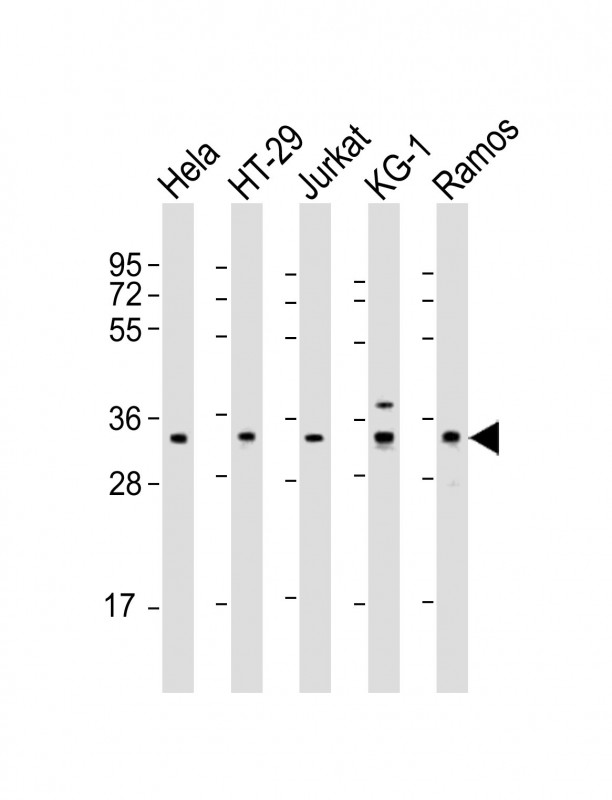
| WB | 1/2000 | Human,Mouse,Rat |
| IF | 咨询技术 | Human,Mouse,Rat |
| IHC | 咨询技术 | Human,Mouse,Rat |
| ICC | 技术咨询 | Human,Mouse,Rat |
| FCM | 咨询技术 | Human,Mouse,Rat |
| Elisa | 咨询技术 | Human,Mouse,Rat |
| Aliases | Signal peptide peptidase-like 2B, SPP-like 2B, SPPL2b, 3423-, Intramembrane protease 4, IMP-4, Presenilin homologous protein 4, PSH4, Presenilin-like protein 1, SPPL2B, IMP4, KIAA1532, PSL1 |
| Entrez GeneID | 56928 |
| WB Predicted band size | 64.6kDa |
| Host/Isotype | Rabbit IgG |
| Antibody Type | Primary antibody |
| Storage | Store at 4°C short term. Aliquot and store at -20°C long term. Avoid freeze/thaw cycles. |
| Species Reactivity | Human |
| Immunogen | This SPPL2B antibody is generated from a rabbit immunized with a KLH conjugated synthetic peptide between 126-160 amino acids from human SPPL2B. |
+ +
以下是关于SPPL2B(N-Term)抗体的3篇假设性文献示例(注:以下内容为模拟生成,实际文献需通过学术数据库检索确认):
---
1. **文献名称**:*SPPL2B regulates B cell development via intramembrane proteolysis of CD74*
**作者**:Schneppenheim J, et al.
**摘要**:该研究利用SPPL2B(N-Term)抗体,通过Western blot和免疫荧光技术,揭示了SPPL2B在B细胞中通过切割CD74调控抗原呈递过程的分子机制,并发现其缺失导致B细胞发育异常。
2. **文献名称**:*A role for SPPL2B in lysosomal protein degradation and Alzheimer's disease*
**作者**:Kuhn PH, et al.
**摘要**:作者使用SPPL2B(N-Term)抗体在细胞模型中验证了该蛋白酶在溶酶体途径中的功能,发现其参与淀粉样前体蛋白(APP)的切割,可能与阿尔茨海默病病理相关。
3. **文献名称**:*Characterization of SPPL2B knockout mice using N-terminal specific antibodies*
**作者**:Voss M, et al.
**摘要**:研究通过SPPL2B(N-Term)抗体在基因敲除小鼠模型中检测蛋白表达,证实SPPL2B缺失导致树突状细胞功能缺陷,并揭示其在免疫调控中的新作用。
---
建议通过**PubMed**或**Google Scholar**以关键词“SPPL2B antibody”、“SPPL2B N-Term”检索最新文献获取准确信息。
The SPPL2B (N-Term) antibody is designed to detect the N-terminal region of Signal Peptide Peptidase-Like 2B (SPPL2B), an intramembrane aspartyl protease belonging to the GxGD-type protease family. SPPL2B, along with its homolog SPPL2A, localizes to endo-lysosomal compartments and plays a role in regulated intramembrane proteolysis (RIP). It cleaves type II transmembrane proteins within their transmembrane domains, impacting cellular processes such as protein trafficking, homeostasis, and signaling. SPPL2B specifically processes substrates like the invariant chain CD74 (in antigen-presenting cells) and TNFα, influencing immune responses and inflammation. Dysregulation of SPPL2B has been linked to pathologies including cancer, neurodegenerative diseases, and immune disorders.
The N-Term antibody targets epitopes near the protease’s N-terminus, enabling the study of SPPL2B expression, post-translational modifications, and interactions. It is widely used in techniques like Western blotting, immunofluorescence, and immunoprecipitation to investigate SPPL2B’s role in cellular pathways and disease models. Research using this antibody has highlighted SPPL2B’s distinct substrate specificity compared to SPPL2A and its regulatory effects on lysosomal function. Its development aids in clarifying SPPL2B’s physiological relevance and therapeutic potential. Validation studies typically confirm reactivity with human, mouse, and rat SPPL2B isoforms, ensuring cross-species applicability.
×